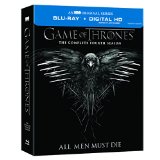| Reviews & Columns |
|
Reviews DVD TV on DVD Blu-ray 4K UHD International DVDs In Theaters Reviews by Studio Video Games Features Collector Series DVDs Easter Egg Database Interviews DVD Talk Radio Feature Articles Columns Anime Talk DVD Savant Horror DVDs The M.O.D. Squad Art House HD Talk Silent DVD
|
DVD Talk Forum |
|
|
| Resources |
|
DVD Price Search Customer Service #'s RCE Info Links |
|
Columns
|
|
|
Game of Thrones: The Complete Fourth Season
HBO // Unrated // February 17, 2015
List Price: $79.98 [Buy now and save at Amazon]
The Season:
What's life like in Westeros after the Red Wedding, the now-notorious event -- both in George R. R. Martin's A Song of Ice and Fire novel series and HBO's Game of Thrones adaptation -- which revealed that nobility, duty, and honor aren't the saving-grace themes they typically are in other narratives? Traditional heroics already took a mighty blow around Eddard Stark's failed attempt at bringing order to the fractured Seven Kingdoms, but that still couldn't prepare audiences (at least, those who haven't read the books) for the tragic turns that came with The Rains of Castamere thumping in the background. That's the moment where it becomes clear that Martin's world is one of tragedy, of true back-stabbing and self-preservation that leaves any and all characters open to abruptly meeting their end, and it'd be reasonable to assume at the close of Game of Thrones' third season that the story might not be one of proper comeuppance or reward for enduring the bleakness. Fret not, though: this following season, while still carrying its own impeccably crafted and suspenseful catastrophe, offers some justly-deserved and highly-satisfying incentives for braving the Winter thus far.
As a reader of Martin's Storm of Swords, which was only half-covered in season three, I somewhat felt obligated to assure show watchers -- many of whom threatened to abandon it in a fit of rage -- that better times were to come if creators David Benioff and D.B. Weiss intended on following the plot. To be honest, it's understandable that some might feel the urge to jump ship after season three (which others should view before continuing with this review to avoid spoilers): two of the show's few remaining "good guys", Robb and Catelyn Stark, were swiftly annihilated, severing all control they had over the North and leaving the remaining Stark children to fend for themselves in their respective states of torment. Westeros' fate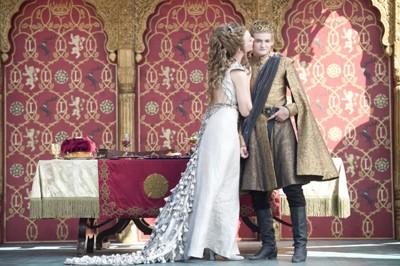 would be decided by less-desirable individuals occupying the Iron Throne: some, like Daenerys (Emilia Clarke) the Breaker of Chains and Mother of Dragons, garner sympathy for their cause despite their reckless and volatile nature; others, like Stannis the Mannis Baratheon (Stephen Dillane) and his dabbling in darker powers with the "red woman" (Carice van Houten), instill some trepidation with their authoritative desires and reliance on magic. Alas, the Lannisters remain in power at King's Landing, with Joffrey Baratheon's (Jack Gleeson) cruelty and Tywin Lannister's (Charles Dance) heartless cunning kicking into gear following the slaughter of Winterfell's remaining dominant wolves ... and the approach of the child king's own wedding.
would be decided by less-desirable individuals occupying the Iron Throne: some, like Daenerys (Emilia Clarke) the Breaker of Chains and Mother of Dragons, garner sympathy for their cause despite their reckless and volatile nature; others, like Stannis the Mannis Baratheon (Stephen Dillane) and his dabbling in darker powers with the "red woman" (Carice van Houten), instill some trepidation with their authoritative desires and reliance on magic. Alas, the Lannisters remain in power at King's Landing, with Joffrey Baratheon's (Jack Gleeson) cruelty and Tywin Lannister's (Charles Dance) heartless cunning kicking into gear following the slaughter of Winterfell's remaining dominant wolves ... and the approach of the child king's own wedding.
Early in the fourth season, Tywin Lannister gives an illuminating-- though, expectedly, cynical and lopsided -- lecture about kingship that might make some viewers reconsider who they'd like to eventually sit in the Iron Throne once the dust settles, contemplating what values the ideal ruler of Westeros should possess. Now, more than ever, Game of Thrones isn't about who'd be a fit ruler under ideal circumstances; instead, it's about who'd be able to get things under enough control to eventually reach a state of "ideal circumstances". In that, the show further steeps itself in an pessimistic atmosphere of gray morality and dire circumstance following the death of the Starks, hinged on sacrifices for the ever-evolving principle of a "greater good" and that playing by-the-books won't cut it under the oppression of rulers who aren't afraid of getting their hands dirty. Due to the biased maneuverings of "the game", the show both keeps its audience at arm's length with its thematic relevance and invites those watching to have fun with the ponies they pick in the race for the throne, though at this point it's more like picking the lesser of evils.
Choosing among Westeros' many potential rulers becomes even more complicated across the fourth season, in the best of ways. A lot of justified criticism has been lobbed at recent blockbuster movie franchises for splitting up one book into two -- sometimes three -- installments, often leading to a bloated representation of the material and a split in the narrative, creating tone disparity and unrewarded build-up. Technically, Game of Thrones finds itself guilty of doing the same things with "A Storm of Swords", but this marks the (very) rare occasion where the separation of content actually benefits a visualization of the material, forcing a gap between the dour, tragic sentiments that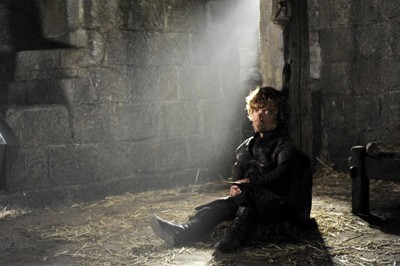 linger near the middle of the novel and the vastly more gratifying repercussions that follow in the second half. Martin was far from done with abruptly rearranging the power structure of Westeros with the Red Wedding, and with the separation of seasons, HBO's series gives his cluster of major developments the room needed take deep dramatic, meaningful breaths ... and offer rewards to those who've stuck it out.
linger near the middle of the novel and the vastly more gratifying repercussions that follow in the second half. Martin was far from done with abruptly rearranging the power structure of Westeros with the Red Wedding, and with the separation of seasons, HBO's series gives his cluster of major developments the room needed take deep dramatic, meaningful breaths ... and offer rewards to those who've stuck it out.
Amid all this, "imp" Tyrion Lannister (Peter Dinklage) once again finds himself under dire circumstances, with increasingly slim resources at his disposal to wriggle out of the situation. There are generally two sides to Peter Dinklage's performance as Tyrion: the manipulative aristocrat who plays King's Landing with cloudy motives and a sharp tongue, and the melancholy criminal awaiting punishment for deeds he may or may not have committed. Game of Thrones' fourth season is largely dominated by the latter version of Tyrion, yet the situation result in a more burdened, reflective version of his temperament than we've seen before, as well as arguably Peter Dinklage's best work on the show to-date. Years of pissing his life away on base urges and squeaking out of situations -- and years of people learning his tics and tactics -- are finally starting to catch up with him, reflected in Dinklage's tone of despair as every move of Tyrion's receives a countermove. Eventually, this leads to him lowering his verbal filter for a spell, and the resulting mix of harshness towards the unaware innocents he's saved and the philosophy he contemplates becomes a mesmerizing pillar to this season's success.
Tyrion's not the only character who undergoes noticeable changes, though. The weight of melancholy events spread across Westeros -- the murders, the kidnappings, the tortures, the battles -- have taken their toll on just about every primary character in the series, and they're starting to really show in their temperaments amid this time of transition. The loss of Jaime Lannister's (Nikolaj Coster-Waldau) sword-wielding hand has humbled him, which adds some anticipated complexity once he returns to King's Landing, to his sister Cersei (Lena Headey), and to his post among the City Watch. Alternately, Brienne of Tarth's (Gwendoline Christie) trials have, in ways, hardened her outlook on life, as well as altered her perception of Jaime "Kingslayer" Lannister,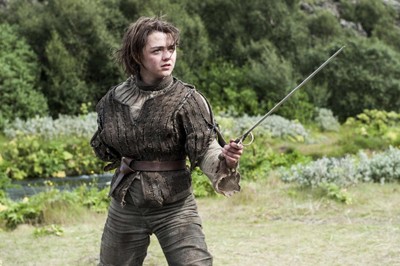 making for some surprisingly growth in their personal chemistry. While already on a downward slope, Arya Stark's (Maisie Williams) loss of nearly all hope after he mother and brothers murder seem to have uncorked a more ruthless, cunning side to her, which makes her travels alongside "The Hound" (Rory McCann) that much more intriguing. The only one who hasn't really changed one iota would be King Joffrey; if anything, he's become more obnoxious and brutal, purposefully dialing up his despicable tempo as swiftly as possible.
making for some surprisingly growth in their personal chemistry. While already on a downward slope, Arya Stark's (Maisie Williams) loss of nearly all hope after he mother and brothers murder seem to have uncorked a more ruthless, cunning side to her, which makes her travels alongside "The Hound" (Rory McCann) that much more intriguing. The only one who hasn't really changed one iota would be King Joffrey; if anything, he's become more obnoxious and brutal, purposefully dialing up his despicable tempo as swiftly as possible.
The approach of Joffrey's arranged wedding to Margaery Tyrell (Natalie Dormer) becomes a crucial element to Game of Thrones' fourth season, one which emphasizes those new attitudes and further introduces the audience to other power players across Westeros, both political and physical. While the once-great swordsman Jaime reacquaints himself to wielding a blade and standing amongst the City Watch after losing his hand, a new warrior shows up to attend the wedding: Prince Oberyn, the Red Viper of Dorne, handsomely played by Pedro Pascal. His thirst for erotic pleasure is matched only by his scorn for the Lannisters, taking shape amid his eased conversations with Tyrion and reaching a furious, volatile point during one of the season's most overtly brutal displays. We're also given a slightly closer look under the hood of the Tyrell family, how Margaery and her house cope with the idea of her marriage to King Joffrey, to which Natalie Dormer's performance -- especially around Lena Headey's predictable sharp portrayal of Cersei Lannister -- takes advantage of those moments where her character's own relaxed cunning emerges.
On the other side of Westeros, in the sandy and desolate expanse of Daenerys' growing empire (and growing dragons), Game of Thrones continues to develop the distrust brewing among her ranks and her liberation of slaves from under the control of aristocrats. It would've been easy for the writers to have made the freedom of slaves into a simplistic and easily-satisfying affair, where freedom meant nothing but empowerment and happiness; however, amid those tones, the show also takes a more complex look at what happens to the people freed under her dominant reign, slaves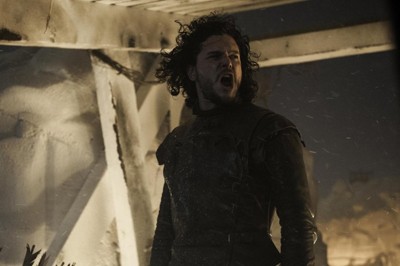 left without purpose and owners who reclaim their "property" once the Breaker of Chains' back is turned. Amid that, Daenarys continues to develop an independent, shrewd personality through Emilia Clarke's spellbinding mix of lost innocence and hardening maturity, driven by repressed desires and reliance on faith in strangers. She also struggles with the increasing size and independence of her "children", becoming a problem that grows further beyond her control, reaching a heartbreaking and poetic climax near the end of this season.
left without purpose and owners who reclaim their "property" once the Breaker of Chains' back is turned. Amid that, Daenarys continues to develop an independent, shrewd personality through Emilia Clarke's spellbinding mix of lost innocence and hardening maturity, driven by repressed desires and reliance on faith in strangers. She also struggles with the increasing size and independence of her "children", becoming a problem that grows further beyond her control, reaching a heartbreaking and poetic climax near the end of this season.
There's an entire episode dedicated to events at The Wall this time around, "The Watchers on the Wall", the culmination of consistent updates on what's going on with Jon Snow (Kit Harington) after his time with the Wildlings. At some point earlier in the series, that would have sounded a tad wearisome: the stark winter at Castle Black as a backdrop for a full hour of Jon Snow's futile struggle with the Night's Watch. Following Snow's experiences beyond The Wall, however, along with his broken relationship with Ygritte (Rose Leslie) and Samwell Tarley's (John Bradley) not-so-craven decisions around a child-carrying ex-Wildling, the events there have taken on more immediacy and evolving character significance. Everything comes to a head in that dedicated episode, standing out as this season's big ninth-episode action piece -- the second directed by Centurion's Neil Marshall, also responsible for season two's "Blackwater" -- a gloriously-paced, brutal bit of raw energy with emotional character interaction woven throughout the elaborate geography of the icy keep.
Despite all the blathering in this review, discussing the events of this season of Game of Thrones without divulging significant spoilers can be a bit tricky, given how much of it hinges on early major incidents that alter the tempo of roughly 75-80% of the episodes. Taken as a whole, however, everything that transpires across these ten episodes ends up being some of the most rewarding and sharply-crafted yet from HBO's show, from the sophisticated portrayals of the characters to the steady, immersive jumps in dramatic nature between the (mostly) equally-engaging story arcs. The writers stick close to the fundamental happenings of "A Storm of Swords" as they play out in text, visualizing them much in the way I pictured them through Martin's prose, while the sporadic additions and alterations -- mostly built around Brienne's search for the Stark children, the fate of Theon Greyjoy (Alfie Allen), and conversations between Tyrion and Jaime about their shared memories -- largely succeed in pushing buttons and organically extending from what happens ... a few nagging oversights notwithstanding. Sufficed to say, the show doesn't let its melancholy build-up following the Red Wedding go down the crapper.
Check Out DVDTalk's Previous Coverage of Game of Thrones on Blu-ray: Season One | Season Two | Season Three
The Blu-ray:
Game of Thrones: The Complete Fourth Season storms onto Blu-ray from Warner Bros./HBO in a four-disc package that'll seem slightly different to those who have collected the previous three seasons. For the most part, everything meets the status quo: a thin cardboard slipcase houses a thick, sturdy inner slipcase for the foldout packaging, which comes adorned with 'shopped stylized photos of the primary cast members. An Episode and Bonus Features Guide is tucked in a flap on the left side of the foldout, which stretches out to contain all ten episodes across five high-definition discs. The whole thing is more compact in size, though, and for good reason: the separate folder of DVD discs typically tucked in with the Game of Thrones seasons has been abandoned this time around, leaving only the Blu-rays and a Digital Copy download slip. Aside from that change, however, the fourth season lines up with the rest of the series packages before it, even reverting to a darker spine instead of the glaring white shade of last season's non-exclusive design. The adaptive menu presentation and "Play All" functionality carries over from the previous seasons, too, a fine use of Blu-ray's capabilities that often goes overlooked.
Video and Audio:
Against its European backdrops and impeccably detailed production, Game of Thrones has consistently provided a benchmark for high-definition content, meeting and surpassing the quality one might find in big-screen fantasy productions. Something differentiates this season from the others, though, with some additional fire lit underneath its visual quality due to the emergence of two, state-of-the-art 6K RED digital cameras on-set, named Dragons, also made of carbon fiber for more versatile movement. The results? Believe it or not, Game of Thrones does indeed impress even more through its slate of 1.78:1-framed, 1080p AVC treatments, mostly in complex terrains and close-quartered settings. The depth captured in the image is predictably astounding across the board, sporting impeccable contrast levels that further elevate one's perception of the dimensionality. Whether it's in the frigid blues and black of Castle Black (and beyond the wall), the dry and sun-baked tans of Daenerys' domain, or the mucky yet lush greens and browns of The North, every color gradient is faultlessly rendered and every texture insurmountably crisp. Skin shades and facial hair, metallic and stone surfaces, laps of fire and splashes of water ... all stunningly projected with no sign of distortion.
Hardly any complaints can be brought up about Game of Thrones' consistent sonic quality on Blu-ray over the years, and these 5.1 DTS-HD Master Audio tracks don't abandon their duty in that regard, either. Every clank of a blade, shriek of a dragon, and fiery explosion hit hard and strong across both the front and rear channels, with shrewd high-end clarity to accentuate each element's natural properties. Subtler sound effects -- the pouring of wine, the gallop of horse hooves, the thwomp of arrows -- stay pronounced and articulate, with impressively aware separation along the front-end of the surround stage. Both hushed whispers and volatile, angry yelling are in large supply throughout the King's Landing politics and fierce action spread across the Seven Kingdoms, and every drop of dialogue pours out with impeccable, organic clarity and zero distortion. And, as usual, the show's signature musical robustness thunders along with exemplary balance throughout the surround channels, while atmospheric effects like wind and snow at Castle Black and the echo of activity in dungeons and great halls add just the right amount of balanced surround activity. Phenomenal. French, Spanish, Castellano, Polish, and Czech language options are also available, along with thirteen subtitle choices.
Special Features:
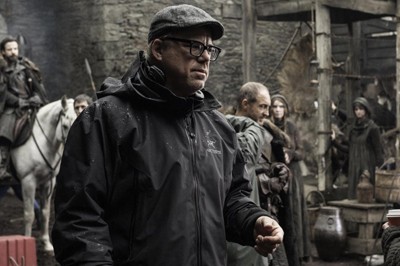 Once again, WB/HBO match expectations for the Blu-ray presentation of Game of Thrones by delivering a trove of extras spread across all episodes, though some are more robustly covered than others. Eleven (11) Audio Commentaries accompany almost all of the episodes, typically including the installments' directors and/or key actors (and George R.R. Martin for the all-important Episode 2, who chats about the fan name for Joffrey's wedding and the initial idea to split "A Storm of Swords" up in a similar fashion to how the series has done it). Episode 3, "Breaker of Chains", ends up being the only installment without a commentary, while Episodes 9 and 10, "The Watchers on the Wall" and "The Children", justly receive two commentaries each. Some players may have an issue with the menus, however, as toggling the commentaries in the "On" position didn't activate them on my updated Sony player; the commentaries can be manually accessed by flipping to the second English audio option, though. All episodes arrive with an interactive In-Episode Guide, revealing textual information about the lore and characters of Westeros as it applies on a scene-by-scene basis.
Once again, WB/HBO match expectations for the Blu-ray presentation of Game of Thrones by delivering a trove of extras spread across all episodes, though some are more robustly covered than others. Eleven (11) Audio Commentaries accompany almost all of the episodes, typically including the installments' directors and/or key actors (and George R.R. Martin for the all-important Episode 2, who chats about the fan name for Joffrey's wedding and the initial idea to split "A Storm of Swords" up in a similar fashion to how the series has done it). Episode 3, "Breaker of Chains", ends up being the only installment without a commentary, while Episodes 9 and 10, "The Watchers on the Wall" and "The Children", justly receive two commentaries each. Some players may have an issue with the menus, however, as toggling the commentaries in the "On" position didn't activate them on my updated Sony player; the commentaries can be manually accessed by flipping to the second English audio option, though. All episodes arrive with an interactive In-Episode Guide, revealing textual information about the lore and characters of Westeros as it applies on a scene-by-scene basis.
The other special features have been strategically placed on Disc One and Disc Four, the two discs in the set with only two episodes on them instead of three, ensuring that all episodes have room to breathe. The supplements on the first disc naturally start out with a nearly half-hour recap of season three, The Politics of Power (25:02, 16x9 HD), featuring the show's cast retelling the primary elements and some secondary nuances of what transpires. Then, the features segue into a pair of season four-centric featurettes, starting with The Bastards of Westeros (7:16, 16x9 HD), featuring George R.R. Martin and show-runners D.B. Weiss and David Benioff as they discuss the differences in perceptions of illegitimate children in different regions across the lands. The other, New Characters and Locations (7:06, 16x9 HD), touches on the new locations explored in this season, mostly in Daenerys' travels, as well as the new significant Dornish and Wildling characters introduced.
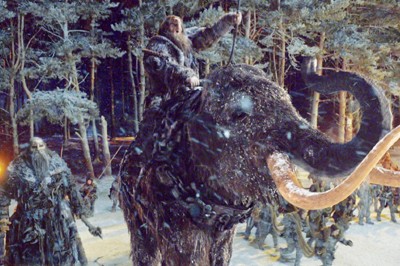 Disc Four carries the brunt of the dedicated supplements, spearheaded by two beefy and wonderful pieces that truly hallmark what this show's become. Chief of them comes in a nearly forty minute exploration of "The Watchers on the Wall", entitled Beyond the Battle for The Wall (37:11, 16x9 HD). Director Neil Marshall, the show's producers and visual effects crew break down the many components of the show's most elaborate action "sequence" to date, from green-screen application to the enormous practical effects involved and the willingness of the actors to get wrapped up in the gravitas. The work already shows on-screen during the episode, but there are so any elements revealed in this featurette that it's almost impossible not to develop a higher level of appreciation for what's accomplished. The Fallen: A Roundtable (29:37, 16x9 HD) gathers together seven (!) of the actors involved in some rather, uh, finite moments across this season, recounting their first scenes on the show and how they learned they were going to die on the show, guided by producer/writer Bryan Cogman's "moderation".
Disc Four carries the brunt of the dedicated supplements, spearheaded by two beefy and wonderful pieces that truly hallmark what this show's become. Chief of them comes in a nearly forty minute exploration of "The Watchers on the Wall", entitled Beyond the Battle for The Wall (37:11, 16x9 HD). Director Neil Marshall, the show's producers and visual effects crew break down the many components of the show's most elaborate action "sequence" to date, from green-screen application to the enormous practical effects involved and the willingness of the actors to get wrapped up in the gravitas. The work already shows on-screen during the episode, but there are so any elements revealed in this featurette that it's almost impossible not to develop a higher level of appreciation for what's accomplished. The Fallen: A Roundtable (29:37, 16x9 HD) gathers together seven (!) of the actors involved in some rather, uh, finite moments across this season, recounting their first scenes on the show and how they learned they were going to die on the show, guided by producer/writer Bryan Cogman's "moderation".
The rest of disc four gets filled out with an extensive Histories and Lore interactive section, featuring in-character recordings from the likes of Oberyn Martell, Jaime Lannister, Bronn, and others as they recount stories about respective houses, landmarks, professions, and relics across Westeros, each accompanied by graphic novel-inspired animated sequences. We've also got a collection of two Deleted Scenes (3:05, 16x9 HD) and a short but fun Blooper Reel (2:02, 16x9 HD).
Final Thoughts:
It might not be the most popular of opinions, but Game of Thrones slumped a little for me throughout the second and third seasons. They're both dynamic, merciless examples of low-fantasy television that I still enjoyed watching, clearly, but they were marred by some pacing and focus issues as they adapted George R.R. Martin's prose, feeling as if something was missing up until the final two episodes of the third season began to muster more strength. None of the content had matched the first season in quality ... that is, until season four came along. Every aspect of this batch of ten episodes feels tighter, more poignant, deftly performed, and above all else more intriguing than the previous two seasons, exploring this version of Westeros that lacks ideal leaders for Westeros as it scrambles to make sense of the many moving pieces of its politics. The action hits harder, the visual and production effects are frequently more robust, and the characters reach some truly involving highs and lows. This rendition of the second half of George R.R. Martin's "A Storm of Swords", one that'll be easier for most to relish following the Red Wedding, stands toe-to-toe with the tragic saga of Eddard Stark as the series' finest run to-date. WB/HBO's Blu-ray is a marvel on Blu-ray, sporting impeccable audiovisual properties and a sublime cornucopia of extras that include commentaries, a making-of segment on this year's "episode nine", and a terrific roundtable with the actors whose characters perished this season. DVDTalk's Collector Series.
Thomas Spurlin, Staff Reviewer -- DVDTalk Reviews | Personal Blog/Site
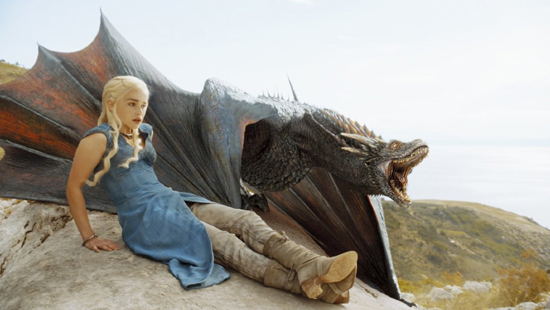 |
What's life like in Westeros after the Red Wedding, the now-notorious event -- both in George R. R. Martin's A Song of Ice and Fire novel series and HBO's Game of Thrones adaptation -- which revealed that nobility, duty, and honor aren't the saving-grace themes they typically are in other narratives? Traditional heroics already took a mighty blow around Eddard Stark's failed attempt at bringing order to the fractured Seven Kingdoms, but that still couldn't prepare audiences (at least, those who haven't read the books) for the tragic turns that came with The Rains of Castamere thumping in the background. That's the moment where it becomes clear that Martin's world is one of tragedy, of true back-stabbing and self-preservation that leaves any and all characters open to abruptly meeting their end, and it'd be reasonable to assume at the close of Game of Thrones' third season that the story might not be one of proper comeuppance or reward for enduring the bleakness. Fret not, though: this following season, while still carrying its own impeccably crafted and suspenseful catastrophe, offers some justly-deserved and highly-satisfying incentives for braving the Winter thus far.
As a reader of Martin's Storm of Swords, which was only half-covered in season three, I somewhat felt obligated to assure show watchers -- many of whom threatened to abandon it in a fit of rage -- that better times were to come if creators David Benioff and D.B. Weiss intended on following the plot. To be honest, it's understandable that some might feel the urge to jump ship after season three (which others should view before continuing with this review to avoid spoilers): two of the show's few remaining "good guys", Robb and Catelyn Stark, were swiftly annihilated, severing all control they had over the North and leaving the remaining Stark children to fend for themselves in their respective states of torment. Westeros' fate
 would be decided by less-desirable individuals occupying the Iron Throne: some, like Daenerys (Emilia Clarke) the Breaker of Chains and Mother of Dragons, garner sympathy for their cause despite their reckless and volatile nature; others, like Stannis the Mannis Baratheon (Stephen Dillane) and his dabbling in darker powers with the "red woman" (Carice van Houten), instill some trepidation with their authoritative desires and reliance on magic. Alas, the Lannisters remain in power at King's Landing, with Joffrey Baratheon's (Jack Gleeson) cruelty and Tywin Lannister's (Charles Dance) heartless cunning kicking into gear following the slaughter of Winterfell's remaining dominant wolves ... and the approach of the child king's own wedding.
would be decided by less-desirable individuals occupying the Iron Throne: some, like Daenerys (Emilia Clarke) the Breaker of Chains and Mother of Dragons, garner sympathy for their cause despite their reckless and volatile nature; others, like Stannis the Mannis Baratheon (Stephen Dillane) and his dabbling in darker powers with the "red woman" (Carice van Houten), instill some trepidation with their authoritative desires and reliance on magic. Alas, the Lannisters remain in power at King's Landing, with Joffrey Baratheon's (Jack Gleeson) cruelty and Tywin Lannister's (Charles Dance) heartless cunning kicking into gear following the slaughter of Winterfell's remaining dominant wolves ... and the approach of the child king's own wedding. Early in the fourth season, Tywin Lannister gives an illuminating-- though, expectedly, cynical and lopsided -- lecture about kingship that might make some viewers reconsider who they'd like to eventually sit in the Iron Throne once the dust settles, contemplating what values the ideal ruler of Westeros should possess. Now, more than ever, Game of Thrones isn't about who'd be a fit ruler under ideal circumstances; instead, it's about who'd be able to get things under enough control to eventually reach a state of "ideal circumstances". In that, the show further steeps itself in an pessimistic atmosphere of gray morality and dire circumstance following the death of the Starks, hinged on sacrifices for the ever-evolving principle of a "greater good" and that playing by-the-books won't cut it under the oppression of rulers who aren't afraid of getting their hands dirty. Due to the biased maneuverings of "the game", the show both keeps its audience at arm's length with its thematic relevance and invites those watching to have fun with the ponies they pick in the race for the throne, though at this point it's more like picking the lesser of evils.
Choosing among Westeros' many potential rulers becomes even more complicated across the fourth season, in the best of ways. A lot of justified criticism has been lobbed at recent blockbuster movie franchises for splitting up one book into two -- sometimes three -- installments, often leading to a bloated representation of the material and a split in the narrative, creating tone disparity and unrewarded build-up. Technically, Game of Thrones finds itself guilty of doing the same things with "A Storm of Swords", but this marks the (very) rare occasion where the separation of content actually benefits a visualization of the material, forcing a gap between the dour, tragic sentiments that
 linger near the middle of the novel and the vastly more gratifying repercussions that follow in the second half. Martin was far from done with abruptly rearranging the power structure of Westeros with the Red Wedding, and with the separation of seasons, HBO's series gives his cluster of major developments the room needed take deep dramatic, meaningful breaths ... and offer rewards to those who've stuck it out.
linger near the middle of the novel and the vastly more gratifying repercussions that follow in the second half. Martin was far from done with abruptly rearranging the power structure of Westeros with the Red Wedding, and with the separation of seasons, HBO's series gives his cluster of major developments the room needed take deep dramatic, meaningful breaths ... and offer rewards to those who've stuck it out. Amid all this, "imp" Tyrion Lannister (Peter Dinklage) once again finds himself under dire circumstances, with increasingly slim resources at his disposal to wriggle out of the situation. There are generally two sides to Peter Dinklage's performance as Tyrion: the manipulative aristocrat who plays King's Landing with cloudy motives and a sharp tongue, and the melancholy criminal awaiting punishment for deeds he may or may not have committed. Game of Thrones' fourth season is largely dominated by the latter version of Tyrion, yet the situation result in a more burdened, reflective version of his temperament than we've seen before, as well as arguably Peter Dinklage's best work on the show to-date. Years of pissing his life away on base urges and squeaking out of situations -- and years of people learning his tics and tactics -- are finally starting to catch up with him, reflected in Dinklage's tone of despair as every move of Tyrion's receives a countermove. Eventually, this leads to him lowering his verbal filter for a spell, and the resulting mix of harshness towards the unaware innocents he's saved and the philosophy he contemplates becomes a mesmerizing pillar to this season's success.
Tyrion's not the only character who undergoes noticeable changes, though. The weight of melancholy events spread across Westeros -- the murders, the kidnappings, the tortures, the battles -- have taken their toll on just about every primary character in the series, and they're starting to really show in their temperaments amid this time of transition. The loss of Jaime Lannister's (Nikolaj Coster-Waldau) sword-wielding hand has humbled him, which adds some anticipated complexity once he returns to King's Landing, to his sister Cersei (Lena Headey), and to his post among the City Watch. Alternately, Brienne of Tarth's (Gwendoline Christie) trials have, in ways, hardened her outlook on life, as well as altered her perception of Jaime "Kingslayer" Lannister,
 making for some surprisingly growth in their personal chemistry. While already on a downward slope, Arya Stark's (Maisie Williams) loss of nearly all hope after he mother and brothers murder seem to have uncorked a more ruthless, cunning side to her, which makes her travels alongside "The Hound" (Rory McCann) that much more intriguing. The only one who hasn't really changed one iota would be King Joffrey; if anything, he's become more obnoxious and brutal, purposefully dialing up his despicable tempo as swiftly as possible.
making for some surprisingly growth in their personal chemistry. While already on a downward slope, Arya Stark's (Maisie Williams) loss of nearly all hope after he mother and brothers murder seem to have uncorked a more ruthless, cunning side to her, which makes her travels alongside "The Hound" (Rory McCann) that much more intriguing. The only one who hasn't really changed one iota would be King Joffrey; if anything, he's become more obnoxious and brutal, purposefully dialing up his despicable tempo as swiftly as possible. The approach of Joffrey's arranged wedding to Margaery Tyrell (Natalie Dormer) becomes a crucial element to Game of Thrones' fourth season, one which emphasizes those new attitudes and further introduces the audience to other power players across Westeros, both political and physical. While the once-great swordsman Jaime reacquaints himself to wielding a blade and standing amongst the City Watch after losing his hand, a new warrior shows up to attend the wedding: Prince Oberyn, the Red Viper of Dorne, handsomely played by Pedro Pascal. His thirst for erotic pleasure is matched only by his scorn for the Lannisters, taking shape amid his eased conversations with Tyrion and reaching a furious, volatile point during one of the season's most overtly brutal displays. We're also given a slightly closer look under the hood of the Tyrell family, how Margaery and her house cope with the idea of her marriage to King Joffrey, to which Natalie Dormer's performance -- especially around Lena Headey's predictable sharp portrayal of Cersei Lannister -- takes advantage of those moments where her character's own relaxed cunning emerges.
On the other side of Westeros, in the sandy and desolate expanse of Daenerys' growing empire (and growing dragons), Game of Thrones continues to develop the distrust brewing among her ranks and her liberation of slaves from under the control of aristocrats. It would've been easy for the writers to have made the freedom of slaves into a simplistic and easily-satisfying affair, where freedom meant nothing but empowerment and happiness; however, amid those tones, the show also takes a more complex look at what happens to the people freed under her dominant reign, slaves
 left without purpose and owners who reclaim their "property" once the Breaker of Chains' back is turned. Amid that, Daenarys continues to develop an independent, shrewd personality through Emilia Clarke's spellbinding mix of lost innocence and hardening maturity, driven by repressed desires and reliance on faith in strangers. She also struggles with the increasing size and independence of her "children", becoming a problem that grows further beyond her control, reaching a heartbreaking and poetic climax near the end of this season.
left without purpose and owners who reclaim their "property" once the Breaker of Chains' back is turned. Amid that, Daenarys continues to develop an independent, shrewd personality through Emilia Clarke's spellbinding mix of lost innocence and hardening maturity, driven by repressed desires and reliance on faith in strangers. She also struggles with the increasing size and independence of her "children", becoming a problem that grows further beyond her control, reaching a heartbreaking and poetic climax near the end of this season. There's an entire episode dedicated to events at The Wall this time around, "The Watchers on the Wall", the culmination of consistent updates on what's going on with Jon Snow (Kit Harington) after his time with the Wildlings. At some point earlier in the series, that would have sounded a tad wearisome: the stark winter at Castle Black as a backdrop for a full hour of Jon Snow's futile struggle with the Night's Watch. Following Snow's experiences beyond The Wall, however, along with his broken relationship with Ygritte (Rose Leslie) and Samwell Tarley's (John Bradley) not-so-craven decisions around a child-carrying ex-Wildling, the events there have taken on more immediacy and evolving character significance. Everything comes to a head in that dedicated episode, standing out as this season's big ninth-episode action piece -- the second directed by Centurion's Neil Marshall, also responsible for season two's "Blackwater" -- a gloriously-paced, brutal bit of raw energy with emotional character interaction woven throughout the elaborate geography of the icy keep.
Despite all the blathering in this review, discussing the events of this season of Game of Thrones without divulging significant spoilers can be a bit tricky, given how much of it hinges on early major incidents that alter the tempo of roughly 75-80% of the episodes. Taken as a whole, however, everything that transpires across these ten episodes ends up being some of the most rewarding and sharply-crafted yet from HBO's show, from the sophisticated portrayals of the characters to the steady, immersive jumps in dramatic nature between the (mostly) equally-engaging story arcs. The writers stick close to the fundamental happenings of "A Storm of Swords" as they play out in text, visualizing them much in the way I pictured them through Martin's prose, while the sporadic additions and alterations -- mostly built around Brienne's search for the Stark children, the fate of Theon Greyjoy (Alfie Allen), and conversations between Tyrion and Jaime about their shared memories -- largely succeed in pushing buttons and organically extending from what happens ... a few nagging oversights notwithstanding. Sufficed to say, the show doesn't let its melancholy build-up following the Red Wedding go down the crapper.
The Blu-ray:
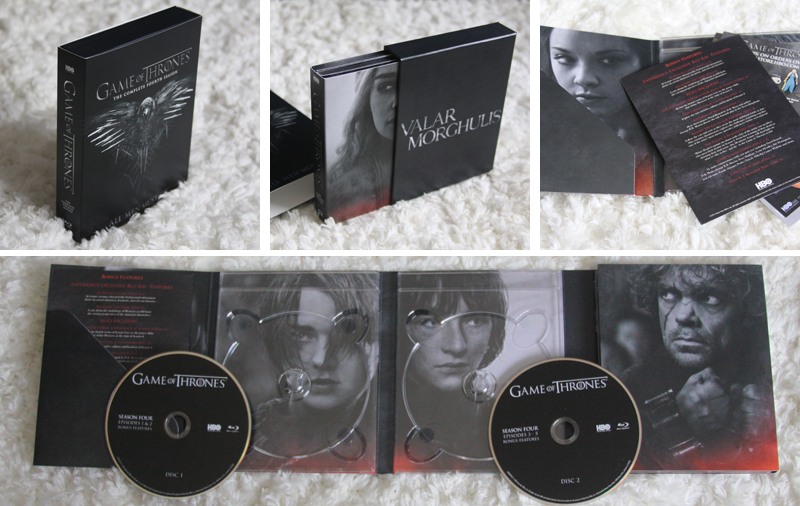 |
Game of Thrones: The Complete Fourth Season storms onto Blu-ray from Warner Bros./HBO in a four-disc package that'll seem slightly different to those who have collected the previous three seasons. For the most part, everything meets the status quo: a thin cardboard slipcase houses a thick, sturdy inner slipcase for the foldout packaging, which comes adorned with 'shopped stylized photos of the primary cast members. An Episode and Bonus Features Guide is tucked in a flap on the left side of the foldout, which stretches out to contain all ten episodes across five high-definition discs. The whole thing is more compact in size, though, and for good reason: the separate folder of DVD discs typically tucked in with the Game of Thrones seasons has been abandoned this time around, leaving only the Blu-rays and a Digital Copy download slip. Aside from that change, however, the fourth season lines up with the rest of the series packages before it, even reverting to a darker spine instead of the glaring white shade of last season's non-exclusive design. The adaptive menu presentation and "Play All" functionality carries over from the previous seasons, too, a fine use of Blu-ray's capabilities that often goes overlooked.
Video and Audio:
Against its European backdrops and impeccably detailed production, Game of Thrones has consistently provided a benchmark for high-definition content, meeting and surpassing the quality one might find in big-screen fantasy productions. Something differentiates this season from the others, though, with some additional fire lit underneath its visual quality due to the emergence of two, state-of-the-art 6K RED digital cameras on-set, named Dragons, also made of carbon fiber for more versatile movement. The results? Believe it or not, Game of Thrones does indeed impress even more through its slate of 1.78:1-framed, 1080p AVC treatments, mostly in complex terrains and close-quartered settings. The depth captured in the image is predictably astounding across the board, sporting impeccable contrast levels that further elevate one's perception of the dimensionality. Whether it's in the frigid blues and black of Castle Black (and beyond the wall), the dry and sun-baked tans of Daenerys' domain, or the mucky yet lush greens and browns of The North, every color gradient is faultlessly rendered and every texture insurmountably crisp. Skin shades and facial hair, metallic and stone surfaces, laps of fire and splashes of water ... all stunningly projected with no sign of distortion.
Hardly any complaints can be brought up about Game of Thrones' consistent sonic quality on Blu-ray over the years, and these 5.1 DTS-HD Master Audio tracks don't abandon their duty in that regard, either. Every clank of a blade, shriek of a dragon, and fiery explosion hit hard and strong across both the front and rear channels, with shrewd high-end clarity to accentuate each element's natural properties. Subtler sound effects -- the pouring of wine, the gallop of horse hooves, the thwomp of arrows -- stay pronounced and articulate, with impressively aware separation along the front-end of the surround stage. Both hushed whispers and volatile, angry yelling are in large supply throughout the King's Landing politics and fierce action spread across the Seven Kingdoms, and every drop of dialogue pours out with impeccable, organic clarity and zero distortion. And, as usual, the show's signature musical robustness thunders along with exemplary balance throughout the surround channels, while atmospheric effects like wind and snow at Castle Black and the echo of activity in dungeons and great halls add just the right amount of balanced surround activity. Phenomenal. French, Spanish, Castellano, Polish, and Czech language options are also available, along with thirteen subtitle choices.
Special Features:
 Once again, WB/HBO match expectations for the Blu-ray presentation of Game of Thrones by delivering a trove of extras spread across all episodes, though some are more robustly covered than others. Eleven (11) Audio Commentaries accompany almost all of the episodes, typically including the installments' directors and/or key actors (and George R.R. Martin for the all-important Episode 2, who chats about the fan name for Joffrey's wedding and the initial idea to split "A Storm of Swords" up in a similar fashion to how the series has done it). Episode 3, "Breaker of Chains", ends up being the only installment without a commentary, while Episodes 9 and 10, "The Watchers on the Wall" and "The Children", justly receive two commentaries each. Some players may have an issue with the menus, however, as toggling the commentaries in the "On" position didn't activate them on my updated Sony player; the commentaries can be manually accessed by flipping to the second English audio option, though. All episodes arrive with an interactive In-Episode Guide, revealing textual information about the lore and characters of Westeros as it applies on a scene-by-scene basis.
Once again, WB/HBO match expectations for the Blu-ray presentation of Game of Thrones by delivering a trove of extras spread across all episodes, though some are more robustly covered than others. Eleven (11) Audio Commentaries accompany almost all of the episodes, typically including the installments' directors and/or key actors (and George R.R. Martin for the all-important Episode 2, who chats about the fan name for Joffrey's wedding and the initial idea to split "A Storm of Swords" up in a similar fashion to how the series has done it). Episode 3, "Breaker of Chains", ends up being the only installment without a commentary, while Episodes 9 and 10, "The Watchers on the Wall" and "The Children", justly receive two commentaries each. Some players may have an issue with the menus, however, as toggling the commentaries in the "On" position didn't activate them on my updated Sony player; the commentaries can be manually accessed by flipping to the second English audio option, though. All episodes arrive with an interactive In-Episode Guide, revealing textual information about the lore and characters of Westeros as it applies on a scene-by-scene basis. The other special features have been strategically placed on Disc One and Disc Four, the two discs in the set with only two episodes on them instead of three, ensuring that all episodes have room to breathe. The supplements on the first disc naturally start out with a nearly half-hour recap of season three, The Politics of Power (25:02, 16x9 HD), featuring the show's cast retelling the primary elements and some secondary nuances of what transpires. Then, the features segue into a pair of season four-centric featurettes, starting with The Bastards of Westeros (7:16, 16x9 HD), featuring George R.R. Martin and show-runners D.B. Weiss and David Benioff as they discuss the differences in perceptions of illegitimate children in different regions across the lands. The other, New Characters and Locations (7:06, 16x9 HD), touches on the new locations explored in this season, mostly in Daenerys' travels, as well as the new significant Dornish and Wildling characters introduced.
 Disc Four carries the brunt of the dedicated supplements, spearheaded by two beefy and wonderful pieces that truly hallmark what this show's become. Chief of them comes in a nearly forty minute exploration of "The Watchers on the Wall", entitled Beyond the Battle for The Wall (37:11, 16x9 HD). Director Neil Marshall, the show's producers and visual effects crew break down the many components of the show's most elaborate action "sequence" to date, from green-screen application to the enormous practical effects involved and the willingness of the actors to get wrapped up in the gravitas. The work already shows on-screen during the episode, but there are so any elements revealed in this featurette that it's almost impossible not to develop a higher level of appreciation for what's accomplished. The Fallen: A Roundtable (29:37, 16x9 HD) gathers together seven (!) of the actors involved in some rather, uh, finite moments across this season, recounting their first scenes on the show and how they learned they were going to die on the show, guided by producer/writer Bryan Cogman's "moderation".
Disc Four carries the brunt of the dedicated supplements, spearheaded by two beefy and wonderful pieces that truly hallmark what this show's become. Chief of them comes in a nearly forty minute exploration of "The Watchers on the Wall", entitled Beyond the Battle for The Wall (37:11, 16x9 HD). Director Neil Marshall, the show's producers and visual effects crew break down the many components of the show's most elaborate action "sequence" to date, from green-screen application to the enormous practical effects involved and the willingness of the actors to get wrapped up in the gravitas. The work already shows on-screen during the episode, but there are so any elements revealed in this featurette that it's almost impossible not to develop a higher level of appreciation for what's accomplished. The Fallen: A Roundtable (29:37, 16x9 HD) gathers together seven (!) of the actors involved in some rather, uh, finite moments across this season, recounting their first scenes on the show and how they learned they were going to die on the show, guided by producer/writer Bryan Cogman's "moderation". The rest of disc four gets filled out with an extensive Histories and Lore interactive section, featuring in-character recordings from the likes of Oberyn Martell, Jaime Lannister, Bronn, and others as they recount stories about respective houses, landmarks, professions, and relics across Westeros, each accompanied by graphic novel-inspired animated sequences. We've also got a collection of two Deleted Scenes (3:05, 16x9 HD) and a short but fun Blooper Reel (2:02, 16x9 HD).
Final Thoughts:
It might not be the most popular of opinions, but Game of Thrones slumped a little for me throughout the second and third seasons. They're both dynamic, merciless examples of low-fantasy television that I still enjoyed watching, clearly, but they were marred by some pacing and focus issues as they adapted George R.R. Martin's prose, feeling as if something was missing up until the final two episodes of the third season began to muster more strength. None of the content had matched the first season in quality ... that is, until season four came along. Every aspect of this batch of ten episodes feels tighter, more poignant, deftly performed, and above all else more intriguing than the previous two seasons, exploring this version of Westeros that lacks ideal leaders for Westeros as it scrambles to make sense of the many moving pieces of its politics. The action hits harder, the visual and production effects are frequently more robust, and the characters reach some truly involving highs and lows. This rendition of the second half of George R.R. Martin's "A Storm of Swords", one that'll be easier for most to relish following the Red Wedding, stands toe-to-toe with the tragic saga of Eddard Stark as the series' finest run to-date. WB/HBO's Blu-ray is a marvel on Blu-ray, sporting impeccable audiovisual properties and a sublime cornucopia of extras that include commentaries, a making-of segment on this year's "episode nine", and a terrific roundtable with the actors whose characters perished this season. DVDTalk's Collector Series.
|
| Popular Reviews |
| Sponsored Links |
|
|
| Sponsored Links |
|
|
| Release List | Reviews | Shop | Newsletter | Forum | DVD Giveaways | Blu-Ray | Advertise |
|
Copyright 2024 DVDTalk.com All Rights Reserved. Legal Info, Privacy Policy, Terms of Use,
Manage Preferences,
Your Privacy Choices | |||||||









